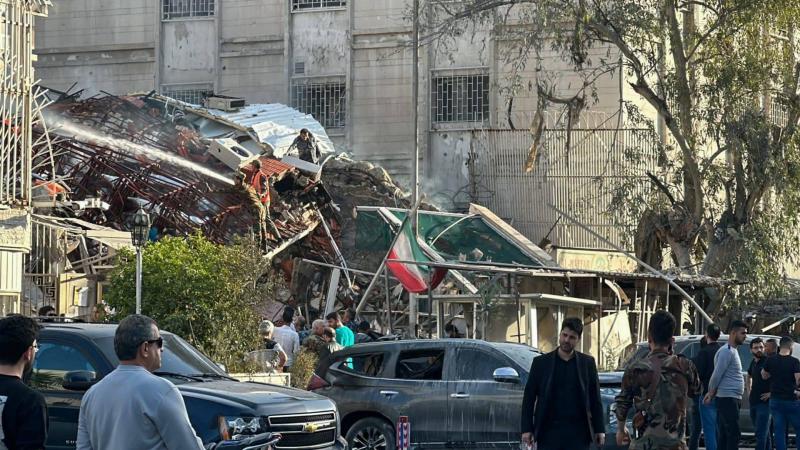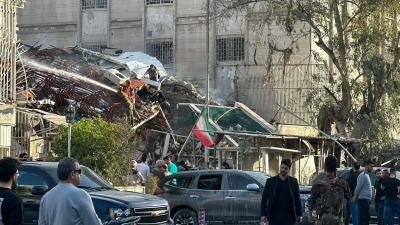Hassan Nasrallah, the Secretary-General of "Hezbollah," clarified that "the presence of the Iranian Revolutionary Guard in Syria and Lebanon dates back to 1982, following the Israeli invasion of Lebanon." He noted that "at that time, Iran was at war, and the war imposed on it was a global one, although the main instigator was the late Iraqi President Saddam Hussein. Nonetheless, due to Imam Khomeini's sense of responsibility toward Lebanon, Syria, and their peoples, he decided to send forces to support the Lebanese and Syrians in confronting the invasion."
In a speech during a commemorative ceremony for the assassination of Iranian General Mohammad Reza Zahidi and his comrades at the Sayyid al-Shuhada complex in southern Beirut, he mentioned that "Iranian forces went to Zabadani in Syria, but following a situation assessment, it was decided to keep a group of Revolutionary Guard officers and personnel to activate popular resistance." He emphasized that "the true presence of the Revolutionary Guard in Syria and Lebanon was that of military advisors."
Nasrallah stated that "the mission of the personnel and officers was to transfer experience to the Lebanese, Palestinians, and Syrians, providing advice, training, and logistical support, without them being required to fight on the ground. Naturally, some of them were martyred in training camps." He pointed out that "with the developments in Syria in 2011, Iranian advisors and forces from the resistance factions in the region arrived, who believed that what was happening in Syria affected the resistance in the region," confirming that "the presence of Iranian military advisors at the Iranian consulate in Damascus is natural and within norms, and their targeting represents the highest Israeli attack on Iranian advisors in Syria in years."
He considered that "this targeting stems from the Israeli understanding of the role of the Guard advisors in the region, and it came because of the failure of the global war on Syria, in which Israel was involved, as it is part of the real battle," explaining that "those present in Syria are military advisers, not Iranian forces, but the Israeli side wants to exaggerate matters."
Nasrallah asserted that "this targeting reflects the Israeli understanding of the role of the Guard advisors in the region, which started years ago following the clarity of the battle's outcome in Syria and the failure of the global war on it, in which Israel was part. There are documents confirming links between armed groups and the Israeli side." He stressed that "targeting Iranian advisors is part of the more clear and legitimate main battle, which is the struggle against the enemy," asserting that "there is no basis for the narrative some are trying to promote, which claims that Syria is occupied by Iran, and that Iran is the decision-maker in Syria. The truth is that the Syrian leadership has its own decision, and the assistance provided by Iran in facing the war was to prevent the domination of Takfiris, Americans, and Israelis over Syria."
Nasrallah mentioned that "there are two new elements in the Israeli aggression on the Iranian consulate in Damascus: first, the targeting is on Iranian soil; this is not just about the martyrdom of Iranian leaders, but there is Iranian land that has been violated. The second new element is the level of the targeting, as General Zahidi was the head of the Iranian advisors in Lebanon and Syria."
He added, "The Americans, Israelis, and almost the entire world have acknowledged that there is an Iranian response to the targeting, which is Iran's natural right. Everyone is waiting to see what will happen and the repercussions of that." Nasrallah revealed that "when Zahidi last visited, he told me that this time he came to be martyred, and that I should not prevent him from going to the front and the south, knowing that I had prevented him during 'The Flood of Al-Aqsa,' even though from the first day he wanted to join the front."
He emphasized that "after six months of the war on Gaza, the objectives set have not been achieved, and Israel's situation has worsened from every possible angle," affirming that "there is no doubt that Israel is fighting one of its longest wars in our region, and they say that 'after six months of the war, we have not retrieved more than half of the captives, we have not entered Rafah, and sirens are still sounding in the Gaza envelope, with announcements of new deaths among officers and soldiers.'"
Regarding the kidnapping of the coordinator of the "Lebanese Forces" in Jbeil, Pascal Suleiman, Nasrallah said: "Thank you to the Lebanese Army and security agencies for their serious follow-up on this issue based on unjust accusations rooted in deep-seated hatred, after the Forces, the Kataeb, and some malicious televisions accused the party of 'kidnapping him.'" He added, "What happened last night is a great lesson for the Lebanese and especially for Christians, and it is a major scandal for the Forces and the Kataeb parties, revealing their true nature and showing that they are instigators seeking civil war. May God protect Lebanon and its people from the evils of hatred and strife."




